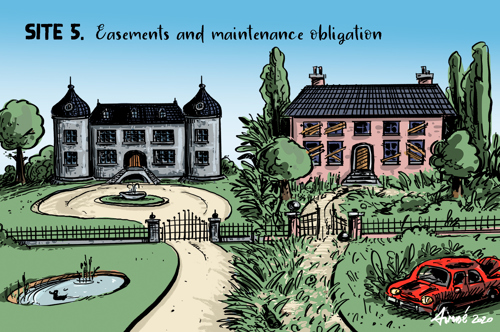- Real Estate, Renting and Co-ownership , Construction Law
- Easements , legal duty to maintain , servient property , dominant property , property law , property , Maintenance and construction works
On this site you will learn more about the legal obligation to maintain the goods that the new property law introduces within the concept of easements.
1. What is an easement?
An easement is a burden on a property (the "servient property") for the use and benefit of another property (the "dominant property").
An easement may be visible or not visible. Where there used to be a lack of clarity about what is a visible and a non-visible easement, a clear definition has been included in the new property law.
So, visible easements are those which are visible to a normally prudent and reasonable holder of a right in rem on the servient property through durable and visible buildings or a regulated activity of which there are traces on the servient property.
In short, in order to be considered as a visible easement, it must be visible through building works or an activity.
All other easements will be regarded as not visible.

2. What is new?
There are two important novelties to be noted within easements, namely the legal duty to maintain and the distance arrangement.
At the current site we will explain the legal duty to maintain.
At site 6 we will further discuss the possibility of waiving an easement.
3. Maintenance and construction works
The holder of an easement - who is the owner of the "dominant property" - may carry out all maintenance and construction works necessary for the exercise of the easement and for its preservation.
Except when the maintenance and construction works are necessary due to a fault of the owner of the "servient property", the works will have to be carried out at the expense of the person having the easement, namely the owner of the "dominant property".
If the works are useful for both properties, costs will be shared.

Attention, it is possible to contractually deviate from these provisions. Therefore, if you wish to make other arrangements when establishing an easement, this must be provided for contractually, preferably in the deed in which the easement is concluded ("deed of establishment").
Avoid later discussions and make sure to arrange everything in your agreements. Seeds of Law is always ready to assist you! You can reach us on +32 (0)2 747 40 07 or via info@seeds.law.
False Read alsoDiscover our e-book about the new property law
In our e-book "Together on a roadtrip through the new property law" you will discover a number of important topics about the new property law.








